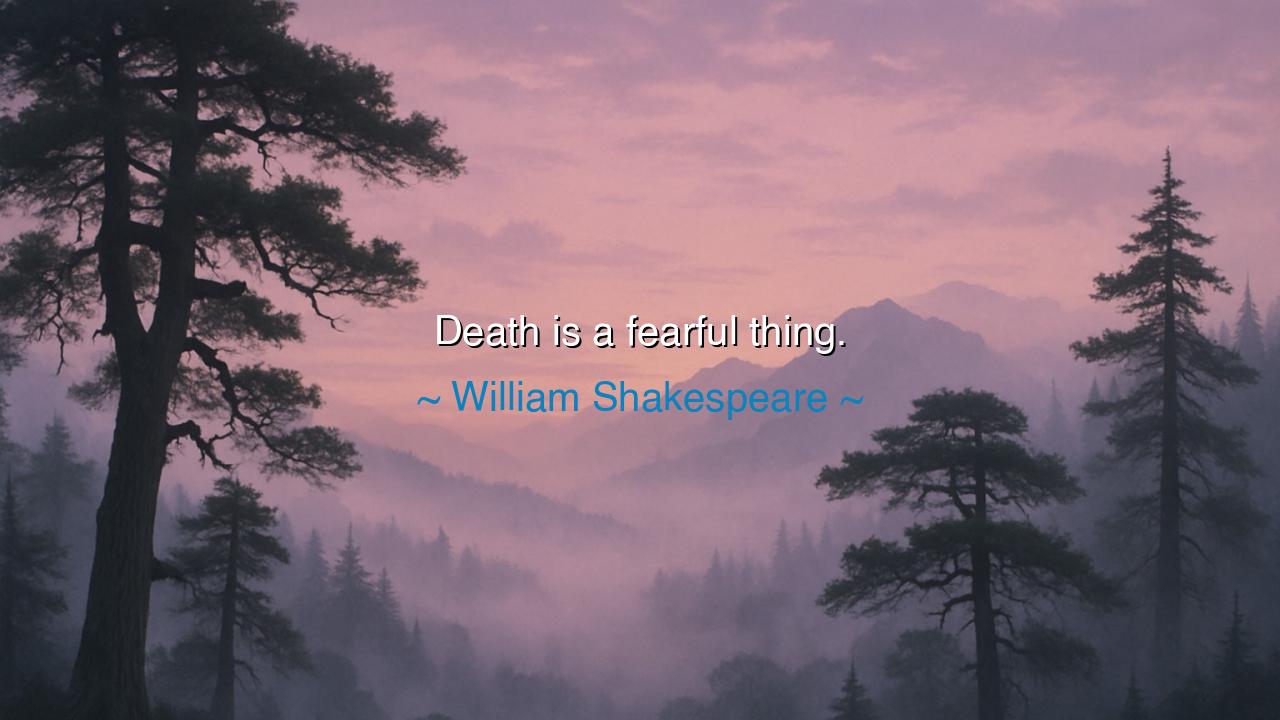
Death is a fearful thing.






“Death is a fearful thing.” So spoke William Shakespeare, the bard whose words still pierce the soul like the tolling of a solemn bell. In this brief utterance lies the echo of every human heart since the dawn of time. For no matter how wise the sage, how brave the warrior, or how faithful the believer, all have felt the trembling of the spirit before that final threshold—the great unknown that swallows kings and beggars alike. Death, the silent sovereign, walks beside us from birth, and though we may grow familiar with its shadow, still it remains fearful, for it is the one mystery we cannot master.
To the ancients, this fear was not weakness but reverence. They did not despise the dread of death; they honored it, for in fear there is knowledge. The Greeks spoke of Thanatos, the god of peaceful death, and of Hades, the keeper of souls. They built their courage not by denying death, but by facing it in poetry, in battle, and in philosophy. To them, fear of death was not a curse—it was the reminder that life is sacred. Shakespeare, wise in the ways of the heart, knew this truth well. When he wrote these words in Measure for Measure, he gave voice to that ancient trembling which lives in all who love life too dearly to let it go.
“Death is a fearful thing,” for it strips away the illusions that cloak our days. Wealth, fame, power—all fall silent before its approach. In its cold gaze, we see what we truly are: fragile, fleeting, human. Consider the tale of Alexander the Great, who conquered nations and dreamed of immortality. When he lay dying, he commanded that his hands be left open upon his bier, that all might see he left the world with nothing. Even the mighty conqueror, whose name echoed across continents, could not command death to yield. And yet, in that final surrender, he too became a teacher—for the fear of death reminds us not to waste the gift of life.
The fearfulness Shakespeare speaks of is not only the terror of ceasing to be—it is also the sorrow of parting, the ache of leaving unfinished dreams, the pain of saying farewell to those we love. It is the fear of stepping into silence when one’s song still trembles on the lips. And yet, this fear is holy, for it teaches tenderness. Those who know death’s shadow learn to cherish the dawn. They love more deeply, forgive more swiftly, and hold the moments of their lives with reverent hands. For when we understand that time is brief, we learn to make each breath a prayer.
But there are those who have looked upon death without trembling, not because they are fearless, but because they are free. Think of Socrates, who drank the hemlock calmly, speaking to his friends of the soul’s immortality. His peace did not come from denial, but from acceptance. He understood what Shakespeare later echoed—that to fear death is to fear truth itself. For death, though fearful, is not cruel; it is the keeper of balance, the end that makes beginnings possible. Without it, life would lose its urgency, and love would lose its flame.
The meaning of Shakespeare’s words, then, is both warning and wisdom. Death is fearful—yes—but it is not to be fled from in cowardice. Its fear teaches us to awaken. The wise man does not pretend death does not exist; he makes peace with it. The brave heart does not scorn fear; it transforms fear into purpose. Those who live with awareness of death’s certainty are not haunted by it—they are illumined by it, walking through life with gratitude instead of haste.
So, my child of breath and dust, fear death—but fear it wisely. Let it not paralyze, but purify you. When you rise each morning, remember the fragile thread that binds you to the world, and let that remembrance sharpen your love, your honesty, your courage. Speak truth, for the tongue may fall silent tomorrow. Hold those you cherish, for their warmth is fleeting. Create, forgive, dream—do not wait, for death is a fearful thing, but only to those who forget to live.
And when your own hour comes, meet it not with bitterness, but with reverence. For though Shakespeare’s words remind us of death’s power, they also whisper of its beauty: that what we fear most may be but the door to peace. Thus live so fully that, when death at last lays its hand upon you, you may look into its eyes without regret—and whisper, “I have lived.”






AAdministratorAdministrator
Welcome, honored guests. Please leave a comment, we will respond soon